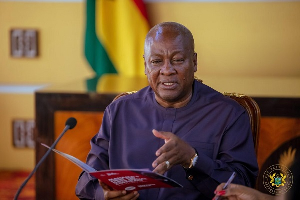: (RE)STRUCTURING GHANA’S TOURISM INDUSTRY FOR SOCIO-ECONOMIC DEVELOPMENT
Since the early 1980s when the erstwhile PNDC government embarked on IMF and World Bank prescribed Economic Recovery Programme and Structural Adjustment Programme (ERP/SAP), the tourism industry in Ghana has experienced sustained steady increase in tourist arrivals from 145,780 in 1990 to 399,000 in 2000 and projected to be around 698,069 in 2008. Tourism has become one of the main pillars that hold the Ghanaian economy. It currently contributes 6.7% to GDP and ranks as fourth highest in terms of foreign exchange earnings after Gold, Cocoa and foreign remittances. Therefore the socio-economic advancement for a non-industrialized economy like the Ghanaian economy, hinges to a large extent on the growth of the tourism industry. The industry is labour intensive, currently accounting for 5.9% of total employment in Ghana and could therefore help alleviate the unemployment problem in the country. Tourism also holds the key to unlocking the entrepreneurship potentials of the Ghanaian youth as it provides a ready market for several products and services such as transport, handicrafts, accommodation, food, cleaning and security, to mention a few.
It is against this background that there is great cause for concern about the recent negative growth experienced by the hospitality segment of the industry as reported in the budget statement for 2012. The hotels and restaurant segment experienced a negative growth rate of -11% though it was projected to grow by 13.5%. This is not the first time that growth projections for the sector have not been achieved but this is the worst performance of the sector in recent times and should certainly raise eyebrows. This gloomy state of affairs could be partly attributed to the global financial crisis but more importantly, non-implementation of tourism policies, inadequate research and marketing efforts, high cost of doing business in Ghana and low level of domestic tourism.
Generally, the global financial crisis experienced in the late 2000s has had a telling effect on the tourism industry. The tourism industry globally bore the brunt of the global financial crisis between 2008 and 2009. According to the United Nations World Tourism Organization (UNWTO), the growth rate of GDP for the travel and tourism industries slowed by 1.0% in 2008, the weakest performance since the 2001-2003 recession. Also, international tourist arrivals declined in the first quarter of 2009 by 8% compared to the same period in the previous year. The global financial meltdown has also had a ripple effect on travel and tourism even beyond 2010 since most tourists plan their trips in advance. Since tourism is a global industry, Ghana’s tourism industry is not insulated from the effects of the financial crisis. Though international tourist arrivals increased by about 16% between 2007 and 2008, receipts per arrival decreased by about 12%, from about US$2000 in 2007 to about $1770 in 2008. The global economic meltdown nonetheless has contributed to the negative growth experienced by the hospitality segment of the tourism industry in Ghana.
Some tourism development plans have been formulated since the 1970s. These include the 15 year tourism development plan (1975-1990); 15 year tourism development plan (1996-2010); and the strategic action plan (2003-2007); National Tourism Marketing Strategy (2009-2012); and Medium Term Development Plan (2010-2013). However, these plans have not been implemented to the letter as a result of changes in government and lack of funding. As a result targets spelt out in these plans have largely not been realized. The 15 year tourism development plan of 1975 to 1990 targeted 357,000 arrivals by 1990 but only 145,780 was realized by the end of the period. Also, the strategic action plan of 2003-2007 targeted one million arrivals by 2007 but by the end of the period, a little over half of that figure (586,612) had been realized. While these tourism development plans have emphasized growth and competitiveness of the industry, the essential institutional framework and resources necessary for growth and competitiveness of the industry have been lacking. More needs to be done with respect to the integration of tourism with other sectors of the economy such as agriculture, community involvement in tourism development, provision of investment incentives through taxation and establishment of a tourism development fund. Generally, pro-poor tourism policies have been lacking and that is unfortunate for a country where tourism attractions are located in poverty-stricken communities. It is an undeniable fact that Accra is the capital city but why should a greater part of the country’s development be concentrated in Accra at the expense of other parts of the country? Such lopsided development only results in the bulk of tourism expenditure and investment taking place in urban areas whilst host communities especially in rural areas are short-changed.
Hopefully, the passing of the Tourism Act, 2011 (ACT 817) by parliament which has changed the name of the Ghana Tourist Board (GTB) to Ghana Tourism Authority (GTA) will help address some of the above issues since by this Act, the GTA is to become a more proactive tourism development authority. It is however important to note that this is not the first time it has assumed that name. In fact before 1977, it was known as the Ghana Tourist Control Authority. The passing of the bill should not be seen just as another naming ceremony but the restructuring and repositioning of the authority. Under the previous administration, the name of the tourism ministry was changed twice; Ministry of Tourism and Modernization of the Capital City as well as Ministry of Tourism and Diasporan Relations. However, this did not lead to a significant improvement in the status quo. It is better to have a Ghana Tourist Board that is adequately resourced it to carry out its mandate than a GTA without enough resources. The National Tourism Organizations of some of the world’s most popular and competitive tourist destinations such as England and Spain are still referred to as Tourist Boards.
Tourism is increasingly becoming competitive and many destinations are mapping out strategies to gain a competitive edge. The key to remaining competitive however lies in the availability of information on a country’s tourism resources, tourism market segments and other competing destinations. Such information which can be derived through market research feeds into the marketing strategy a destination. In the marketing strategy document for 2009-2012, there is absolutely nothing on target market segments and competing destinations such as Senegal because such data is not readily available. How effective can a coach’s strategy be if he does not know the team he will be playing against? The research and marketing efforts of Ghana as a destination, which is normally undertaken by the GTA is inadequate mainly due to the insufficiency of resources at its disposal. There is the need to obtain greater insights into our tourism market segments such as Business, Leisure, VFR as well as African American, African, European and Asian markets among others. This would enable us tailor the tourist product to meet the specific needs of our target market segments. Tourism market research should not be restricted to the compilation of statistics on tourist arrivals, receipts, employment etc. but more importantly information on the motivations, characteristics and attitudes of target market segments. There is also the need to be more accurate in our projections on tourist arrivals. For instance, in 2003, it was projected that the country will receive over one million (1,062,000) tourists in 2007 but the real arrivals turned out to be 586,612. Also in the build up to the African Cup of Nations in Ghana in 2008, Ghanaians were told to expect one million tourists and sports fans for the event. But the reality was a far cry from what was predicted as some matches were played in virtually empty stadia compelling hotel proprietors and investors who had made huge investments to expand their facilities to ask ‘na tourists no w?n w? hin?’ (so where are the tourists?). Modest margins of error in projections are acceptable but such huge margins between projected and actual figures are worrisome and could create credibility problems. There are time tested models for predicting tourist arrivals and the GTA could seek collaboration with research institutions and universities to help resolve this issue. Both academia and the GTA must make a conscious effort to forge greater collaboration.
A comprehensive website (http://www.touringghana.com/) has been created to market Ghana as a preferred tourist destination in Africa and this initiative deserves commendation however, there is more room for improvement. Marketing is an expensive undertaking and the GTA needs to be adequately resourced to carry out this mandate through diverse media. Promotion is just an aspect of marketing. There is therefore the need to ensure that there is a strategic fit among the marketing mix of Ghana as a tourist destination i.e. products, prices, promotion, places, people, processes and physical evidence. This demands concerted efforts from all stakeholders. For instance, Ghana is considered as an expensive destination. Also, the quality of services is generally low. Moreover, a number of attraction sites lack basic amenities and infrastructure yet the construction of tourism receptive facilities at some of our attraction sites has become a recurring theme in budget statements each year.
There is also the need to ensure that what is promised in advertisements is delivered. There still appears to be no clear consistent image of the country to project. It was to resolve this problem that the Brand Ghana Office was established in September 2009. However, two years down the line, we still do not have a national brand identity. As a result, conflicting slogans are being projected by various organizations, businesses and destinations as if branding is just about slogans. Slogans like ‘proverbial hospitality’, ‘golden experience’, ‘centre of the world’, ‘culture, warmth and much more’ etc. are being employed in advertisements. Having a national brand identity which resonates with our target markets will help in our quest to make Ghana a preferred tourist destination in Africa.
Ghana is considered an expensive tourist destination because the cost of hotel accommodation and air transport is relatively higher. For instance a standard room at a 4 star Golden Tulip hotel in Ghana is $225, in Nigeria it is $195 while in the USA it is $100. The cost of air transportation to Ghana is not different. This is partly due to the high cost of doing business in Ghana. Operators of tourism and hospitality businesses have complained about numerous direct and indirect taxes, duties on imported goods, high cost of utilities and other overhead expenses. They have no option than to pass these costs on to consumers.
One of the reasons for the upsurge in foreign investment in the tourism industry in the latter part of the 1980s and1990s was the PNDC Law 116 of 1985 which provided generous investment incentives such as free repatriation of profits, remittances by expatriate personnel and import duty exemptions. However, this was repealed in the GIPC Act 478 of 1994 only for it to be revived by issuing a legislative instrument in 2005 intended for the promotion of tourism (LI 1817) by the GIPC. This has also been repealed by the current administration whilst the corporate tax rate has been reduced from 22% to 20%. Though this is appreciable, it is not enough. There is the need for a focused, clear and consistent investment policy if government wants to encourage both local and foreign investment in the industry.
Ghana cannot develop its full tourism potential if domestic tourism does not occupy its rightful place in the tourism equation. For most of the world’s top tourist destinations such as France, UK, Spain and USA, domestic tourism accounts for between 60-80% of their tourist arrivals. Overdependence on international tourists could spell doom for the industry especially if as a result of financial and other political reasons; there is a sharp decline in international arrivals. It means tourism and hospitality businesses which depend essentially on international tourists such as airlines and hotels would operate under capacity, lay off workers, incur losses and eventually fold up. However, with a sufficient domestic tourism base, these businesses would manage to keep their heads above water. In the UK, as a result of the global financial crisis, in 2008, international tourist arrivals dropped by more than 3% to 14.8 million, however, this was offset by domestic tourist arrivals which rose by more than 11% to 11.3 million. Domestic tourism is still low in Ghana partly due to the overconcentration on marketing Ghana to international tourists. There are not enough marketing programmes targeting domestic tourists and most often governments have emphasized international tourism which is seen as a catalyst for foreign exchange and revenue maximization. The level of domestic tourism is also a reflection of the economic realities which confront Ghanaians. Tourism is mainly a leisure activity and people will indulge in it only after they have met their more pressing needs. The question is how can the average Ghanaian indulge in tourism activities when he/she cannot afford the basic necessities of life? This is where the government can institute a social tourism package as part of the social welfare system to help the underprivileged and families with low incomes to also travel within the country. School children especially should be encouraged to travel. The culture of travel should be imbibed in them so that when they grow, they will not depart from it.
For the tourism and hospitality industry to enjoy sustained and accelerated growth there is the need for government to show greater commitment. Though tourism is the fourth highest contributor to our foreign exchange earnings and contributes 6.7% to GDP, it is perhaps the least resourced industry in terms of budgetary allocations. Budgetary allocation to the Ministry of Tourism has even declined from GH¢17,225,167 in 2011 to GH¢9,658,622 in 2012. It is also fair to say that the private sector must complement the efforts of government by initiating its own programmes as well as collaborating with the GTA and other organizations to undertake training, marketing and research activities.
In effect, Ghana remains a force to be reckoned with in terms of tourism in Africa. However, recent negative growth recorded in the hospitality segment should be seen as a clarion call to government and other stakeholders to put all hands on deck to avoid killing the goose that lays the golden egg. The current restructuring of the industry through the Tourism Act, 2011 (ACT 817) should hold great promise for the industry.
Ishmael Mensah is a Lecturer at the Department of Hospitality and Tourism Management, University of Cape Coast, Ghana.
E-mail: aprakof@yahoo.com
Opinions of Thursday, 1 December 2011
Columnist: Mensah, Ishmael


















